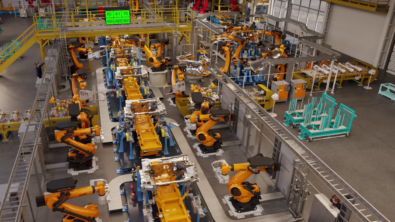The Berlin Security Conference and the digitalization of logistics

From November 30 to December 1, 2022, leaders in politics, military, business, and the civilian sector from across Europe and NATO will be gathering at the Vienna House Andel’s Berlin for the Berlin Security Conference (BSC). It is one of the largest events of its kind where experts from across the world discuss the security and defense policies of Europe. For us at Siemens, this year’s conference is a special one as Todd Tuthill, Vice President of Aerospace & Defense Strategy and Marketing, has been asked to moderate one of the conferences panels. In this panel, Reinforcement Sustainment Network – Opportunities and Challenges, participants will discuss the challenges and solutions of cross-European defense logistics, a prime candidate for the application of digitalization.
As the title suggests, the panel will focus on the logistics and support required for sustained supply chains and reinforcements across Europe. Some of these critical topics are wide-ranging, like the challenges of moving strong formations across Europe and the Atlantic and how countries defend vulnerable reinforcement deployment points like ports and airports. Other topics apply to NATO specifically, including the status of the NATO Central and Northern European pipeline system and who will provide air cover for NATO deployments during times of tension. All of these are vital for the defense of Europe. After all, it was General Dwight D. Eisenhower who said, “You will not find it difficult to prove that battles, campaigns, and even wars have been won or lost primarily because of logistics.”
Multiple potential solutions will be discussed during the panel, but one particularly promising option is how digitalization can enhance these areas of logistics. Digital technologies like the digital twin are already being used to enhance the logistics of multiple industries, from energy and manufacturing to automotive and aerospace. Companies build digital twins not only of their products, but also the factories that manufacture them and the supply chains that keep those factories supplied. . Using the digital twin to command and coordinate reinforcements and equipment is no different, as they need production lines and supply chains too. Militaries can simulate everything from hardware to formation movements, allowing them to test deployments and reinforcement strategies before enacting them. This can help them navigate obstacles that may arise when moving troops and equipment over long distances, such as mechanical failures and supply disruptions, as well as utilize the data gathered to make informed, intelligent decisions. Digitalization already supports the logistics of other industries and can easily be applied to enhance defense strategies as well.
Additionally, digitalization will help militaries track equipment better as they are moved across Europe. Modern military hardware like vehicles and defensive machinery are complex, with multiple systems that need to work in tandem, so it is vital that militaries are consistently aware of equipment’s condition and location. Using embedded IoT sensors, they can monitor the present conditions and be alerted if something is out of place, such as a vehicle system degrading to the point of needing repairs or if equipment is running behind schedule. Companies have already implemented these strategies to increase timing and efficiency, so they might as well be applied to defense, where timing and efficiency means everything. Being prompt and prepared is crucial for any well-functioning defense, and the tracking capabilities of digitalization will help significantly.
Todd Tuthill will be moderating this discussion, which will feature key voices from business and the military. The full list of participants can be found in the panel listing here.
Siemens is honored to play a role in the Berlin Security Conference and help facilitate the discussion for the deployment of sustained reinforcements. The conference is not only vital for determining the security strategies of Europe, but also provides a great forum for exploring how digitalization can be applied to enhance defensive capabilities and supply chains. Digitalization offers new opportunities to strengthen defensive strategies and ensure the security of nations like never before.
Siemens Digital Industries Software helps organizations of all sizes digitally transform using software, hardware and services from the Siemens Xcelerator business platform. Siemens’ software and the comprehensive digital twin enable companies to optimize their design, engineering and manufacturing processes to turn today’s ideas into the sustainable products of the future. From chips to entire systems, from product to process, across all industries, Siemens Digital Industries Software is where today meets tomorrow.


